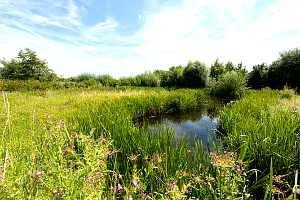Government overlooking cost effective and beneficial flooding solutions
 Two clear opportunities to tackle flooding have been missed by Government, at the same time as publishing evidence of the economic benefits of those approaches.
Two clear opportunities to tackle flooding have been missed by Government, at the same time as publishing evidence of the economic benefits of those approaches.
The economic report published by Defra’s advisers, Natural England, on Monday shows Sustainable Drainage Systems (SuDS) and agricultural management can reduce the £1bn annual bill for flooding.
However, implementation of laws on SuDS dating back to 2010 have yet again been delayed by Defra despite support from planners, communities and environmental groups. The evidence shows the cost of SuDS are about half that of traditional drainage over a 60 year life span.
Yesterday Secretary of State Owen Paterson revealed a new farming budget that severely restricts support for farmers to act to reduce flooding and pollution. The Natural England report puts the cost of flooding that is attributable to agriculture at £234m, nearly a quarter of the total annual bill.
WWT has published guidelines for both farmers and developers to manage water to reduce flooding and pollution, and create habitats for wildlife and places that people can enjoy at the same time.
Martin Spray, Chief Executive of WWT said:
“When it comes to flooding, a broad coalition agrees what the answers are but the Secretary of State is stalling on turning that into action on the ground. With a general election on the horizon, I’m surprised he’s not leaping on the opportunity for a cheap win-win.
“The Government is spending £1 billion of taxpayer’s money on flooding in an average year. We could be getting more benefits, more efficiently by working with nature and creating a better environment for people and wildlife at the same time. Public money should deliver multiple public benefits. We will continue to offer our expertise to the Government, but we want to see this put into action.”
SuDS encompass a range of natural ways to capture rain, from green roofs and ponds to much larger areas. They reduce flooding and pollution. WWT has SuDS at its Wetland Centres around the UK and last year published guidance on SuDS that can help wildlife around people’s homes and community spaces, as well as helping manage water. The Water and Flood Management Act 2010 made it compulsory for SuDS to be considered for all new developments, but a letter from Defra announced that it would not be implemented this year as planned.
The majority of England is farmland making the way it is managed hugely significant for our environment. Owen Paterson yesterday announced the ‘greening’ element of the Government’s Common Agricultural Policy review. Just 6% of the UK’s £15bn investment in farming has been allocated for new environmental benefit, while the environmental criteria for farms to receive their standard payment have been diluted so much that they need actually only provide minimal environmental benefit. WWT has worked closely with the Government’s advisers on a proposal that would support farmers to create wetlands to trap pollution and rainwater before it affects streams and rivers and create habitat for wildlife. Yesterday’s announcement means there’s little money available to implement that option even if it is adopted by the Government in future.
WWT advocates investing in natural wetlands to solve the environmental problems we face now and into the future. It runs nine Wetland Centres in the UK where visitors can see examples of working wetlands in use. It also works as a charity on wetland conservation projects around the world, and as a consultant to corporations and public bodies.

